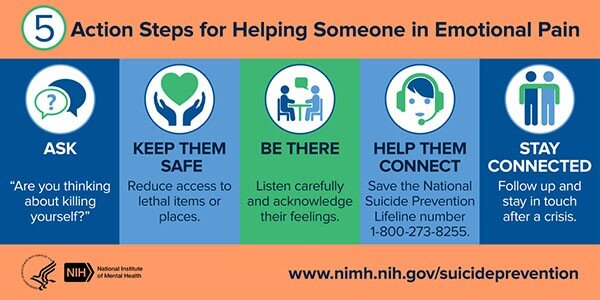You can make a difference.

A PARENT. A CHILD. A RELATIVE. A FRIEND. A FRIEND OF A FRIEND. SADLY, WE ALL KNOW OF A SPECIAL SOMEONE.
The week of September 6th starts National Suicide Prevention Awareness Week. In the past decade, suicide has ranked as the 10th leading cause of death. In 2018, over 48,000 people died by suicide and there was an estimated 1.5 million suicide attempts. Devastatingly, there is an average of 132 suicides per day. You can help; you can make a difference. But how…?
ASK: “Are you thinking about killing yourself?” Because of stigma and personal pain, people with suicidal thoughts and plans often do not who to talk to about their thoughts and feelings. Asking and talking openly about suicide can make a difference.
KEEP THEM SAFE: “Let’s keep you safe by removing things you might use to kill yourself.” Ask if the person has a plan for killing him or herself. Locking lethal items up, giving them to another person for safekeeping, removing them from easy access, leaving a dangerous area can lessen risk of suicide. If possible, safely reducing access to lethal items can make a difference.
BE THERE: “I’d like to stay with you and talk.” Listen carefully to what the person feels and thinks. Acknowledge their pain, fears, and stress. Being with the person and listening to their story can make a difference.
HELP THEM CONNECT: “Let’s call or text for help.” There are phone numbers and text numbers to get support and help; contact one while you are with the person. Encourage the person to save contacts in a cell phone or even take pictures or screenshots of crisis hotlines. Helping the person know how to reach 24/7 help and support can make a difference.
 |
 |
STAY CONNECTED: “Let’s talk again, tomorrow or soon.” Following up with the person can provide even more support and acknowledgment of his or her feelings. If a person is being released from care, a hospital, or an emergency department, connect with them. Ask how they feel; ask if the experience was helpful. Following up and staying connected with the person can make a difference.
Even though you may be unsure, uncomfortable, worried, and even scared, you can make a difference.

PAST ARTICLES
What does women’s health mean to you?
Yes, it is true, that women’s health can be confusing. So many rules and regulations! When do you get a mammogram or a Pap Smear? If you are at high risk for breast cancer, what are your options? Read on.
Age is just a number!
Age is Just a Number! Exercise, nutrition and a close relationship with your medical provider will help you age gracefully.
Kids are Back to School!
Back to School: tips on making those early weeks more successful and throughout the school year.
Help Oak Orchard Health Celebrate Health Center Week and its 50th Anniversary!
Seen your provider lately? It’s probably time.
If you’ve put off seeing a provider because of COVID-19, you’re not alone. Even though life looks a little closer to normal now, a lot of people are still holding off seeing their medical providers, or dentist, or getting important health screenings. But it’s important to make sure you’re headed in the right direction with your health.
Autism Awareness Month
April is the month to recognize and raise awareness of Autism. Autism Spectrum Disorder (ASD) affects 1 in 36 children, 4 times more likely to affect boys than girls. About 40% of children with autism do not speak or might not begin to speak until later in childhood.
Opioid addiction: The road to recovery
When people think of substance use, they typically associate it with having fun and feeling good, however, once an individual crosses over to a state of physical and psychological dependency on that substance, they’re no longer chasing a high—they’re avoiding the agony of withdrawal
Shortage of Dental Hygienists is Nationwide
Having trouble getting a dental appointment? It’s not just you. This is a nationwide problem.
Why and when should adults have routine eye exams? Dry Eye? Bifocals?
Maybe you’ve never worn glasses or contacts, but your eyes do change as you get older. Are your eyes dryer? Forty seems to be a magic number when bifocals may be needed. And of course, cataracts are common as you get older. How can you prevent vision problems?
How can you pay for your health care? We have options.
There are many ways to pay for healthcare and we are here to help. Oak Orchard Health strives to make it simple for you.
